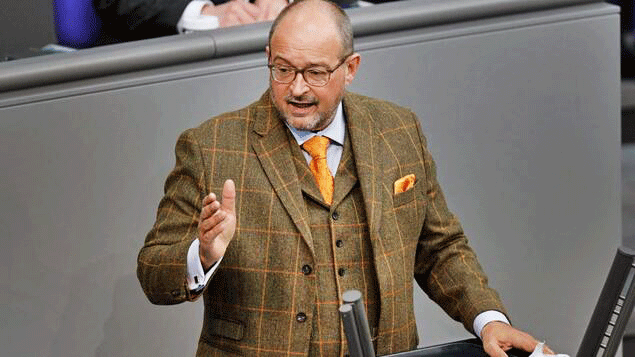Germany’s oldest political party is back in parliament for the first time since 1957. Founded in 1870 to preserve Catholic interests, the Centre Party (Zentrum) is one year older than the German state itself and became a powerful political force in the newly unified empire. But it vanished into obscurity after the Second World War. Now that it has gained an MP in the Bundestag, it says the time is right for a renewed ‘conservative force’.
At first glance the news that Uwe Witt, formerly a member of parliament for Alternative für Deutschland (AfD), has joined a party of only 650 members does not seem to be news at all. He had been the leading candidate for the AfD in the northern state of Schleswig-Holstein and as such gained his seat last year — one of 83 won by the party in the election. In addition to Witt, two other AfD MPs have since left the party — nothing new as it had lost 8 members in the previous parliamentary term as well.
Witt had taken issue with the unacceptable and unchecked behaviour of fellow party members. Matthias Helferich, for instance, referred to himself as the ‘friendly face of Nazism’ and as a ‘democratic Freisler’ — the infamous Nazi judge who had taken part in the Wannsee Conference where the Final Solution was agreed upon. While Helferich was forced to shed party allegiance in parliament, he has not been suspended from the AfD and still serves as its deputy leader in the state of Northrhine-Westphalia.
Perhaps a little naively, Witt had joined the AfD not to associate with people like Helferich, but because he felt politically homeless. In that, the 62-year-old former steel fitter stands in for many Germans with conservative political instincts. In her 16-year-tenure, ex-chancellor Angela Merkel had pulled her Christian Democratic Party (CDU) so far to the Left that it became practically indistinguishable from the Social Democratic Party (SPD). This exposed the entire Right flank of the political spectrum to oddballs and extremists. Many moderate conservatives have ended up flirting with the AfD. Many turned their backs on it again, disillusioned with the lack of discipline and decency.
The Centre Party hopes that Witt’s defection into its ranks is a ‘signal of a new beginning’. It is convinced that ‘people want a new and serious conservative-social political force’. Witt too is hopeful that, ‘given the current political landscape, we can offer a new grassroots movement, democratic and conservative.’
I sincerely doubt that the Centre Party will become a major political force — it has neither got the funding nor the infrastructure. As a party, their history is also deeply rooted in Catholicism and while, like the CDU, they are now a Christian party for all denominations, conservative voters who are not deeply religious might be put off.
But there are some intriguing concepts here. As a party for all Catholics — from businessman to coal miner, the original Zentrum were unique in their classless approach to politics. They advocated better conditions for their working-class voters while strongly opposing socialism, keeping their middle-class support happy. As Catholics, they also had a healthy scepticism of state interference from Protestant Berlin and fiercely defended areas such as education or local politics from centralisation. There is nothing comparable on offer in the Germany of today — not for Catholics, not for anybody else.
The case of Uwe Witt highlights a problematic legacy of Merkel’s tenure. For centre-Right voters like him, there is nowhere to go. The vast majority of conservatives will continue to vote for the CDU and SPD only to grumble about the resulting policies, but a significant proportion will continue to look further right for alternatives finding none until they get to the far end. Germany’s political landscape lacks balance and that is never healthy for a functioning democracy.











Join the discussion
Join like minded readers that support our journalism by becoming a paid subscriber
To join the discussion in the comments, become a paid subscriber.
Join like minded readers that support our journalism, read unlimited articles and enjoy other subscriber-only benefits.
Subscribe